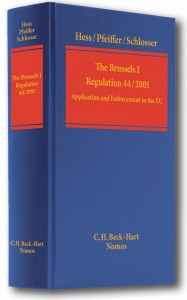Hess on West Tankers
Burkhard Hess is professor of law and director of the Institute for Comparative Law, Conflict of Laws and International Business Law in Heidelberg. He has published extensively in the areas of private international law and international procedural law and is co-author of the General Report of the Study on the Application of Regulation Brussels I (“Heidelberg Report”).
1. The outcome of the ECJ’s judgment is not surprising and, from the point of view of continental procedural law, the findings are completely in line with the framework of the Brussels I Regulation. As the Italian court in Syracuse has been seised under the Regulation, it is for this court to decide on its jurisdiction (Article 5 no 3 Brussels I) and (this is only the second issue) on the scope and the validity of the arbitration clause (Article II NYC).
Despite of some heated criticism which has been brought forward against the conclusions of AG Kokott, the Court comprehensively followed her reasoning. The line of arguments developed in para. 24 of the judgment seems to be similar to the arguments of the ECJ in the Lugano Opinion: The Grand Chamber relies on the effet utile of the Regulation, its “objective of unification of the rules of conflicts of jurisdiction in civil and commercial matters and the free movement of decisions in those matters”. Mutual trust is only used as an additional argument, but much later (para. 30). In my view the judgment demonstrates that the ECJ is “defending” the proper operation of the Regulation and, finally, the priority of Community law. West Tankers is, as Lugano, a political decision.
2. However, as the AG clearly stated, the present situation under the Brussels I Regulation is not satisfactory. With all due respect, I disagree with Adrian Briggs that the issues raised by the House of Lords and the ECJ are not important. After West Tankers, the issue should be addressed in the context of the expected revision of the Brussels I Regulation. In this respect I would like to come back to the proposals of the Heidelberg Report:
The Heidelberg Report on the Application of Brussels I proposed a different mechanism for the protection of arbitration agreements. According to this proposal, a new Article 27 A shall address the situation of threatening parallel arbitral and litigious proceedings, especially when a party institutes proceedings in a domestic court of a Member State instead of enforcing the arbitration agreement. Article 27 A should read as follows: “A court of a Member State shall stay the proceedings once the defendant contests the jurisdiction of the court with respect to existence and scope of an arbitration agreement if a court of the Member State that is designated as place of arbitration in the arbitration agreement is seised for declaratory relief in respect to the existence, the validity, and/or scope of that arbitration agreement”.
This provision aims to concentrate all proceedings on the validity of the arbitration agreement in the domestic courts of the Member State where the arbitration takes place. In this respect, the Heidelberg Report proposes to insert a new Article 22 no 6 to the Brussels I Regulation. The new articles shall establish an exclusive competence for proceedings challenging the validity of the arbitration agreement. These proceedings shall exclusively take place in the Member State in which the arbitration takes place.
Article 27 A shall operate as follows: Imagine that a civil court in Member State A is called upon by a party contesting the validity of an arbitration clause providing for arbitration in Member State B. Under Article 27 A Brussels I, the civil court in Member State A shall stay its proceedings until the matter has been referred to the competent court in Member State B. The court in Member State B then decides exclusively on the validity of the arbitration clause (see Article 72 of the English Arbitration Act). In addition, the civil court of Member State A, when staying its proceedings, may set a time limit for the plaintiff (who is contesting the validity of the arbitration clause) to access the courts in Member State B where the arbitration shall take place. Still, the other party may seek redress in the courts of Member State B to get a judgment on the validity of the arbitration clause. If the plaintiff does not institute arbitral proceedings in the “designated” Member State B in a timely manner, the civil court of Member State A will dismiss its proceedings. This example illustrates the proposal’s intention to give full effect to arbitration agreements and to achieve uniform results in all EU Member States.
3. Besides, I fully agree with Horatia Muir Watt’s recent remark that the principle of mutual trust does not automatically imply the (absolute) priority of the court first seised in parallel litigation. European procedural law also provides for a (untechnical) hierarchy between the courts of different Member States (striking examples are found in Articles 11 and 20 of the Brussels II bis Regulation). To my opinion, the Brussels I Regulation should also adopt a hierarchical system giving priority to the court agreed upon in choice of court agreements and to the courts of the place of arbitration in arbitration proceedings.
I am well aware that the proposal of the Heidelberg Report to delete the arbitration exception of Article 1 (2)(d) has been criticised by many stakeholders of the “arbitration world”. However, after West Tankers/Adriatica the legal doctrine should elaborate a more balanced solution in the framework of Brussels I.
4. Finally, some authors raised the question whether the findings of the ECJ also relate to third states. I don’t believe that the Grand Chamber addressed this constellation. However, as the judgment refers to general principles of EC law (paras. 24 and 30), their application in relation to third states seems to be unlikely.

 Advocate General Kokott’s
Advocate General Kokott’s  The Journal of Private International Law will hold its third major conference at New York University on April 17-18, 2009. As was the practice at the prior conferences at the University of Aberdeen in 2005 and at the University of Birmingham
The Journal of Private International Law will hold its third major conference at New York University on April 17-18, 2009. As was the practice at the prior conferences at the University of Aberdeen in 2005 and at the University of Birmingham  Now, on June 1999, the European Court of Justice held in EcoSwissChina that member states ought to consider that article 81 of the EC Treaty belongs to their public policy for the purpose of reviewing arbitral awards. In that case, however, Dutch courts had been unable to review the compatibility of the award with EU antitrust law because the plaintiff had failed to challenge the award in a timely fashion. The ECJ held that it did not intend to change the procedural laws of the member states and that the obligation under Dutch law to initiate the challenge proceedings within 3 months was such procedural rule which could prevent an actual verification of the proper application of antitrust laws.
Now, on June 1999, the European Court of Justice held in EcoSwissChina that member states ought to consider that article 81 of the EC Treaty belongs to their public policy for the purpose of reviewing arbitral awards. In that case, however, Dutch courts had been unable to review the compatibility of the award with EU antitrust law because the plaintiff had failed to challenge the award in a timely fashion. The ECJ held that it did not intend to change the procedural laws of the member states and that the obligation under Dutch law to initiate the challenge proceedings within 3 months was such procedural rule which could prevent an actual verification of the proper application of antitrust laws. In that case, competition law issues had been discussed before the arbitrators, so much so that the contract had been annuled on the ground that it violated it. This was not, however, the end of the story. SNF argued that, by compensating CYTEC only, the tribunal had managed to have the contract indirectly produce effect, and had thus violated antitrust laws anyway. It thus challenged the validity of the award before Belgian courts (as the seat of the arbitration was Brussels). On 8 March 2007, the Brussels first instance court accepted the argument and set aside the arbitral awards on that ground (SNF went on to sue the ICC in Paris for failing to verify whether the arbitrators had properly complied with public policy. The French judgement dismissing the action can be found
In that case, competition law issues had been discussed before the arbitrators, so much so that the contract had been annuled on the ground that it violated it. This was not, however, the end of the story. SNF argued that, by compensating CYTEC only, the tribunal had managed to have the contract indirectly produce effect, and had thus violated antitrust laws anyway. It thus challenged the validity of the award before Belgian courts (as the seat of the arbitration was Brussels). On 8 March 2007, the Brussels first instance court accepted the argument and set aside the arbitral awards on that ground (SNF went on to sue the ICC in Paris for failing to verify whether the arbitrators had properly complied with public policy. The French judgement dismissing the action can be found